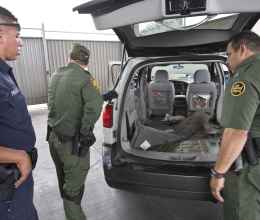March 27, 2020
David Jennings
Acting Field Office Director
U.S Immigration and Customs Enforcement
630 Sansome Street
San Francisco, CA 94611
david.jennings@ice.dhs.gov
Re: Urgent request to release individuals at elevated risk of dying from contracting coronavirus while detained at Mesa Verde
Dear Acting Field Director David Jennings and Warden Nathan Allen:
With authorization from twenty-four individuals at elevated risk of serious illness or death from contracting COVID-19 due to their age and/or underlying medical conditions, we write to request their immediate release from Mesa Verde Detention Facility (“Mesa Verde”). The risk of contracting COVID-19 in congregate settings is very high. Despite an overwhelming consensus of public health experts — including two doctors contracted by the Department of Homeland Security — calling for a systematic reduction in the number of people detained, starting with those who are most vulnerable to COVID-19, you have failed to release people like [redacted], a 74- year-old man with chronic respiratory problems who this week was diagnosed with lung cancer.
You are courting a calamity and endangering us all. We urge you in the strongest terms to change course. Please start by ordering the immediate release of the individuals identified in the chart at the end of this letter
Background
COVID-19 is a rapidly escalating global pandemic with devastating effects.1 There have been 3,158 confirmed diagnoses in California and deaths continue to grow exponentially.2 Those detained in close quarters are particularly susceptible to contracting and rapidly spreading this highly contagious virus.3 Given the threats posed by interpersonal proximity, authorities have issued unprecedented restrictions on human interactions. On March 19, 2020, Governor Newsom issued a shelter-in place order.4
The Centers for Disease Control (“CDC”) and medical professions have issued recommendations to thwart the spread of COVID-19. They recommend strict socially distancing from others as a crucial measure for avoiding transmission, but this is impossible to implement in a detention facility. Detained persons are unable to maintain the recommended distance of six feet from others because they, for example, sleep in massive dormitories with dozens of others within arms-reach. Additionally, medical professionals stress that personal hygiene practices, and frequent sanitation of commonly touched surfaces, are crucial to slowing the spread of the virus. However, we have received complaints from people detained at Mesa Verde alleging shortages of cleaning and personal hygiene supplies, including for example: bleach and other disinfectant products, shampoo, and soap. Detained individuals have complained that commonly used items are not disinfected frequently, such as toilets, showers and tables in common spaces, and the lack of soap inhibits their ability to wash their hands regularly. These deficiencies leave detainees at Mesa Verde at increased risk of contracting communicable diseases, like COVID-19.
Living in close quarters allows, and increases the danger, for outbreaks of highly contagious diseases which spread aggressively in detention centers. Just last summer, Mesa Verde quarantined an entire unit, of about 100 individuals, because of a chickenpox outbreak.5 In the past few weeks, we have seen how COVID-19 has spread at the rate of lighting a match on fire for those in close quarters, such as cruises and nursing homes. Detention centers like Mesa Verde face the same fate; it is not a matter of if, but rather when.
There is consensus among public health experts that the spread of COVID-19 to immigration detention facilities is inevitable and would prove to be devastating absent the necessary measures. On March 19, in a letter to Congress, DHS whistleblower experts stated that “the track record of ICE facilities implementing [early screening, testing, isolation and quarantine] 6 Moreover, they warned that even these precautions were implemented consistently in detention centers they “wont be enough” without rapidly “release[ing] those who do not pose an immediate danger to public safety.”7 Public health experts agree that reducing the number of people detained serves the public interest by reducing the risk of widespread infection in a closed environment, and will help thwart overwhelming the local health care infrastructure—especially intensive care units.8
California jails have recognized the great risk and necessity to release individuals due to health concerned posed by COVID-19, and have released thousands of people incarcerated in the criminal justice system to avoid risking their lives, that of other detainees, and the community at large. Alameda County’s Santa Rita Jail released 250 people;9 Los Angeles County released more than 1,000;10 Kern County, where Mesa Verde is located, has released dozens of people.11
The CDC has concluded that certain underlying medical conditions increase the risk of serious COVID-19 symptoms for people of any age. These include lung disease, heart disease, chronic liver or kidney disease, diabetes, epilepsy, compromised immune systems (such as form cancer, HIV, or an autoimmune disease), blood disorders (including sickle cell disease), inherited metabolic disorders, stroke, developmental delay, and pregnancy. People with these risk factors face a particularly higher degree of contracting COVID-19, and suffering severe consequences including death.
Request for release of individuals at elevated risk
We enclose a list of names and A numbers with corresponding information provided to us regarding each individual’s age and/or medical condition. For these individuals, the vast majority of whom do not have an attorney or the wherewithal to make the request we make in this letter, contracting COVID-19 is especially likely to lead to serious illness or death. Given their significant vulnerabilities, it is a moral and legal imperative that you release them in your discretion to release individuals for serious medical reasons under 8 C.F.R. § 212.5(b)(1).
Detained individuals in Mesa Verde have voiced their concerns and fears of contracting and succumbing to COVID-19. We support such broad requests to be released. The request we make today, however, is of utmost urgency.
Thank you for your urgent attention to this matter. Please let us know if we can provide any additional information.
Sincerely,
Stephanie Padilla
Jordan Wells
ACLU of Southern California
Encl.
c (via e-mail): Nathan Allen
Warden, Mesa Verde Detention Center, GEO Group, Inc.
Nallen@geogroup.com
Partial List of Mesa Verde Detainees at Elevated Risk of Death or Serious Illness If They Contract COVID-19
| Name | A Number | COVID-19 Vulnerability |
|---|---|---|
| CA | [Redacted] | [Redacted] is 74 years old. He has suffered from ongoing respiratory problems, and was diagnosed with lung cancer on March 24, 2020. |
| DAO | [Redacted] | [Redacted] has asthma and other related breathing problems. [Redacted] had an eye operation in prison last year, and has continued to experience related pain. [Redacted] is 43 years old. |
| AOC | [Redacted] | [Redacted] is 66 years old, and has heart problems and various other health issues. |
| YXS | [Redacted] | [Redacted] is 65 years old, and had a stroke. He has high blood pressure, ulcers, gout, and lower back pain. [Redacted] has been a wheelchair for the last 3 years. |
| RFX | [Redacted] | [Redacted] suffers from panic attack, sciatic nerve problems causing his legs to fall asleep and spasm, mental health illness, and is in a wheelchair. |
| JZS | [Redacted] | [Redacted] suffers from diabetes, hypertension, and high cholesterol. |
| AG-A | [Redacted] | [Redacted] is 67 years old. [Redacted] has suffered from lung issues, and has had a cough for about a month. He also has high blood pressure and other related heart conditions, as well as kidney problems and is losing his eyesight. |
| LABG | [Redacted] | [Redacted] has various respiratory issues, including asthma and allergies. [Redacted] has a difficult time breathing, and has noted that the air conditioner aggravates his respiratory issues. [Redacted]s 33 years old. |
| AIMV | [Redacted] | [Redacted] suffers from asthma. [Redacted] is 31 years old. |
| TDD | [Redacted] | [Redacted] has asthma, tuberculosis and hypertension. He is currently under treatment for his tuberculosis. |
| AGM | [Redacted] | [Redacted] is 50 years old and has suffered from high blood pressure for many years. He began to develop a strong cough yesterday, March 24, and was told by Mesa Verde medical staff that it was just a throat infection. |
| LM-H | [Redacted] | [Redacted] is 55 years old and has a heart condition. [Redacted] is also currently taking high blood pressure medication. |
| FR | [Redacted] | [Redacted] is about 60 years old. |
| [Redacted] | [Redacted] | |
| MSM | [Redacted] | [Redacted] suffers from asthma. |
| MAR | [Redacted] | [Redacted] is 51 years old and suffers from multiple health issues, including: heart problems, cysts, cirrhosis, gastritis, claustrophobia and panic attacks. |
| COS | [Redacted] | [Redacted] has high blood pressure and other related heart conditions. |
| MRL | [Redacted] | [Redacted] suffers from chronic respiratory problems and allergies. [Redacted] has severe allergies to the dust in the air condition vents, which aggravate his respiratory problems. |
| RD | [Redacted] | [Redacted] is 60 years old and suffers from asthma. |
| LF | [Redacted] | [Redacted] is 54 years old and has high blood pressure, hypertension, and high cholesterol. [Redacted] had hip surgery and requires a walker to walk. |
| JJCN | [Redacted] | [Redacted] has suffered from seizures and heart problems. |
| AB | [Redacted] | [Redacted] has experienced a difficulty in breathing, and other related respiratory problems. |
| TH | [Redacted] | [Redacted] suffers from tuberculosis. |
| MAG | [Redacted] | [Redacted] has a heart murmur. |
| BGV | [Redacted] | [Redacted] has asthma, and has suffered a heart embolism. He recently became sick and has experienced a runny nose and sore throat. |
1. See L.A. Times, “Tracking coronavirus in California,” L.A. Times (March 26, 2020) available at https://www.latimes.com/projects/california-coronavirus-cases-tracking-outbreak/ (As of March 26, there are 467,593 confirmed cases and 21,180 deaths globally. In the United States there are 65,778 confirmed cases and 942 deaths). ↑ Go back
2. Id. ↑ Go back
3. See NPR, “Prisons and Jails Worry about Becoming Coronavirus ‘Incubators,’” NPR (March 13, 2020), available at https://ww.npr.org/2020/03/13/815002735/prisons-and-jails-worry-about-becoming-coronavirus-incubators. 4 See Ca. Exec. Order No. N-33-20 (March 19, 2020), https://www.fmcsa.dot.gov/emergency/california-governor- newsom-shelter-place-executive-order-n33-20. ↑ Go back
4. See Ca. Exec. Order No. N-33-20 (March 19, 2020), https://www.fmcsa.dot.gov/emergency/california-governor- newsom-shelter-place-executive-order-n33-20. ↑ Go back
5. See Sam Morgen, “Case of chickenpox reported at Mesa Verde,” Bakersfield Californian (June 20, 2019) available at https://www.bakersfield.com/news/case-of-chickenpox-reported-at-mesa-verde/article a3207afa-92ee-11e9- 8045-bf3ae7c14913.html. ↑ Go back
6. Letter from Scott A. Allen, MD and Josiah Rich, MD, MPH to Congressional Committee Chairpersons, dated March 19, 2020, available at https://www.documentcloud.org/documents/6816336-032020-Letter-From-Drs-Allen- Rich-to-Congress-Re html#document/p4/a557238. ↑ Go back
7. Id. ↑ Go back
8. See e.g., Id. Releasing detainees will slow the spread of the coronavirus in detention centers, and help reduce the number of those needing medical treatment from the already-overwhelmed and inadequately prepared local health care providers and facilities. ↑ Go back
9. See Maura Dolan, et al., California releases more jail inmates amid coronavirus crisis, L.A. Times (March 2020) available at https://www.latimes.com/california/story/2020-03-20/california-relases-more-jail-inmates-amid- coronavirus-crisis? ↑ Go back
10. See Alene Tchekmedyian, et al., L.A. County releasing some inmates from jail to combat coronavirus, L.A. Times (March 16, 2020) available at https://www.latimes.com/california/story/2020-03-16/la-jail-population-arrests-down- amid-coronavirus. ↑ Go back
11. See Quinn Wilson, KCSO: Inmate releases based on mitigating spread of COVID-19, reserved for non-violent offenders, Bakersfield Californian (March 19, 2020) available at https://www.bakersfield.com/news/breaking/kcso- inmate-releases-based-on-mitigating-spread-of-covid-/article 10ffc8a206a3d-11ea-b7b06de300554 html. ↑ Go back


